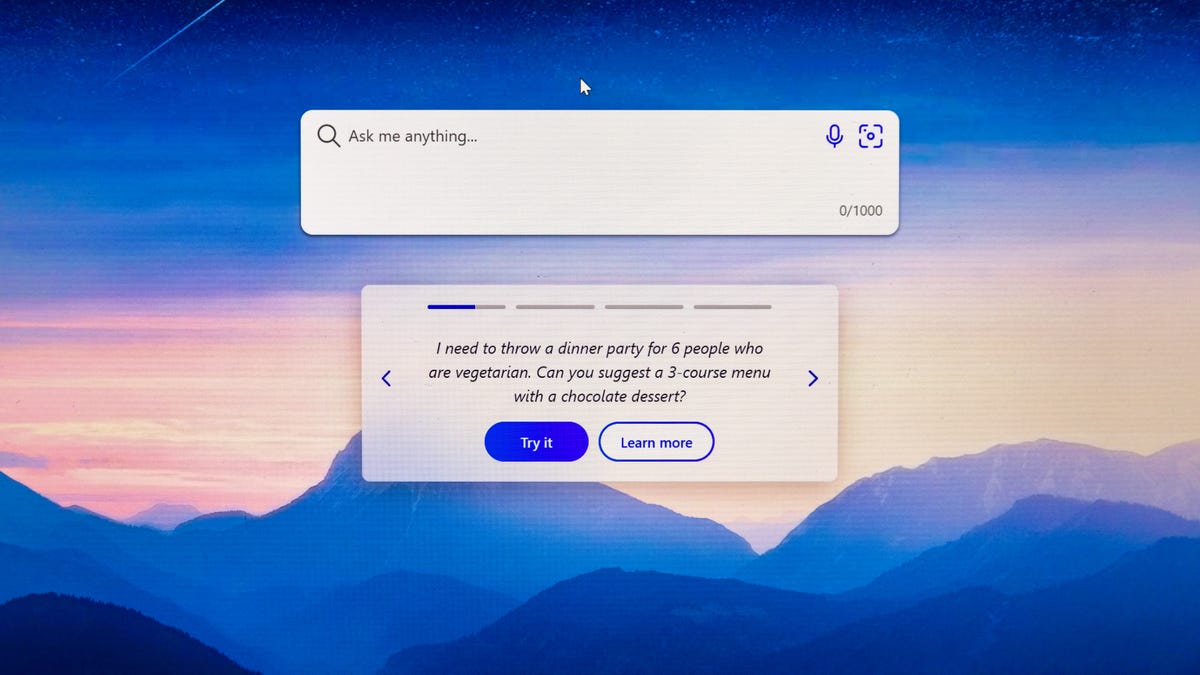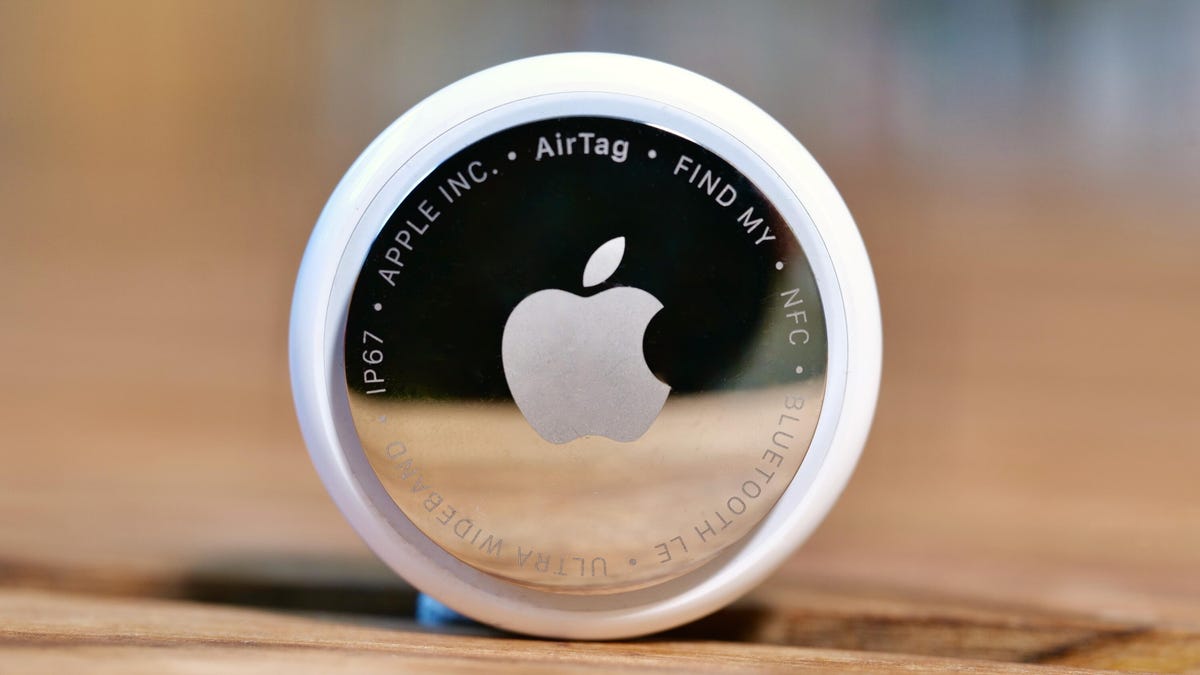Technologies
7 Ways Microsoft Uses AI to Make You Actually Care About Bing
It isn’t just ChatGPT on the Bing website. Microsoft blends OpenAI’s language technology with its own Bing search engine.

Microsoft Bing faces a big problem: Google utterly eclipses search engine. But Bing has a chance to grab more attention for itself with the OpenAI‘s language technology, the artificial intelligence foundation that’s made the ChatGPT service a huge hit.
For the brainier Bing to work, though, Microsoft has to get the details right. ChatGPT can be useful, but it can be flaky, too, and nobody wants a search engine they can’t trust.
Microsoft has put a lot of thought and its own programming resources into the challenge. It’s wrestled with issues like how AI-powered Bing shows ads, reveals its data sources, and grounds the AI technology in reality so you get trustworthy results, not the digital hallucinations that can be hard to spot in machine-generated information.
I spoke to Jordi Ribas, leader of Bing search and AI, to dig more deeply into the overhauled Bing search engine. He’s a big enough fan that he used the technology to help him write his boss a memo about it. «It probably saved me two to three hours,» he said, and it improved the Spanish executive’s English, too.
When the technology expands beyond today’s very small test group, it’ll let millions of us dig for much more complicated information, like whether an Ikea loveseat will fit into your car. And we’ll all be able to see whether it truly gives Google a run for its money. But for now, are seven aspects of Bing AI that I learned.
Bing AI isn’t just a repackaged version of ChatGPT
Microsoft blends its Bing search engine with the large language model technology from OpenAI, the AI lab that built the ChatGPT tool that’s fired up excitement about AI and that Microsoft invested in. You can get ChatGPT-like results using Bing’s «chat» option — for example, «Write a short essay on the importance of Taoism.» But for other queries, Bing and OpenAI technology are blended through an orchestration system Microsoft calls Prometheus.
For instance, you can Bing, «I like the band Led Zeppelin. What other musicians should I listen to?» OpenAI first paraphrases that prompt to «bands similar to Led Zeppelin,» then repackages Bing search results in a bulleted list. Each suggestion, like Fleetwood Mac, Pink Floyd and the Rolling Stones, comes with a two-sentence description.
Bing AI cites its sources — sometimes
When you give ChatGPT a prompt, it’ll respond with text it generates, but it won’t tell you where it got that information. The AI system is trained on vast amounts of the information on the internet, but it’s hard to draw a direct line between that training data and ChatGPT’s output.
On Bing, though, factual information is often annotated, because Bing knows the source from its indexing of the web. For example, in the Led Zeppelin prompt above, Bing includes a link at the top of its answer to a Musicaroo post, 13 Bands That Sound Like Led Zeppelin, and includes that link and others from MusicalMum and Producer Hive.
That sourcing transparency helps address a big criticism of AI, making it easier to evaluate whether the response is accurate or a mere AI hallucination. But it doesn’t always appear. In the essay on Taoism above, for example, there aren’t any sources, footnotes or links at all.
Some source links are ads that make Microsoft money
The Bing AI’s elaborate answers provide a new way for Microsoft to generate money from ads. In traditional Bing searches, the «organic» search results that Bing judges to be most relevant are separate from items placed by advertisers. But with Bing AI searches, the two types of information can be blended.
For example, in its response to the query «plan me a one-week trip to Iceland without a rental car,» AI-powered Bing suggests several destinations. In one of them, several words are underlined: «You can visit places like Vík, Skógafoss, Seljalandsfoss, and Jökulsárlón glacier lagoon by joining a multi-day tour or taking a bus.» Hovering over that link shows three sources for that information and an ad from a tour company. The advertisement is the top item of the three and is labeled «ad.»
«When you look at those citations, sometimes they are ads,» Ribas said. «When it’s more of a purchasing intent query, you hover over it and you’ll see the list of the references and sometimes it’s an ad. Then sometimes in the conversation itself, you’re going to see product ads, like if you do a hotel query.»
Ad revenue is a big deal, since it takes weeks of work on an enormous cluster of computers for OpenAI to build a single update to its language model, and OpenAI CEO Sam Altman estimates it costs a few cents to process each ChatGPT prompt. Bing, even though it’s a distant second to Google in the search engine market, still handles millions of queries a day.
Google plans to open access to its Bard AI chatbot soon, but it won’t be including ads to begin with.
OpenAI-boosted results are more relevant than plain old Bing
The fundamental measure of a search engine’s usefulness is whether its results are relevant, and the OpenAI technology brings a huge boost in the measurement that Microsoft uses to score its search engine results’ relevance.
«My team, working super, super hard in a given year, might move that metric by one point,» Ribas said, but OpenAI’s technology boosted it three points in one fell swoop. «It’s just never happened before in the history of Bing,» Ribas said.
That relevance boost is just for ordinary search results, Ribas added. OpenAI’s technology can further improve Bing with its chat interface that offers more elaborate answers and a follow-up exchange.
OpenAI makes Bing better with languages besides English
One particular area where Bing has been weak is searches that aren’t in English, and Ribas said OpenAI helps there. A lot of Bing’s three-point gain in relevance scoring «came from international markets,» Ribas said.
OpenAI’s large language model, or LLM, is trained with text from 100 languages. «Catalan is my first language. I can have a dialogue in Catalan. It works really, really well,» Ribas said
Bing brings OpenAI’s results up to date
Large language models like OpenAI’s GPT-3.5, the foundation for ChatGPT, are slow to build and improve, which means they don’t move at the speed of the web or of conventional search engines. GPT-3.5, for example, was trained in 2021, so it doesn’t have any idea about Russia’s invasion of Ukraine, the effects of recent inflation on consumers, or Xi Jinping securing his third term as general secretary of the Chinese Communist Party.
Bing often does know this more recent information, though. «When you bring in the Bing results, then you will get fresh results on that complete answer,» Ribas said.
Bing ‘grounds’ OpenAI’s flights of fancy
Microsoft uses its Bing data to try to avoid situations where OpenAI’s more creative technology could lead people astray. The more factual a query and answer are, the more Bing’s technology is used in the answer, Ribas said. This «grounding» significantly reduces AI’s problems with making stuff up: «It will reduce hallucination, which is … an ongoing battle,» Ribas said.
But Microsoft doesn’t want its grounding system to squash all the magic out of the AI. There’s a reason ChatGPT has been so captivating. The Prometheus system decides on the priorities for each query.
«We had to find the sweet spot between over-grounding the model and keeping it interesting,» Ribas said. «We have a measurement of the interestingness of the results, and we have a measurement for the groundedness of the results. The more the query is looking for something very factual, the more we weight the grounded. The more the query is supposed to be creative, the less we weight the grounded. I kept telling my team, I want my cake and eat it too.»
Technologies
Today’s Wordle Hints, Answer and Help for Feb. 1, #1688
Here are hints and the answer for today’s Wordle for Sunday, Feb. 1, No. 1,688.

Looking for the most recent Wordle answer? Click here for today’s Wordle hints, as well as our daily answers and hints for The New York Times Mini Crossword, Connections, Connections: Sports Edition and Strands puzzles.
Today’s Wordle puzzle is a tough one, with some unusual letters. If you need a new starter word, check out our list of which letters show up the most in English words. If you need hints and the answer, read on.
Read more: New Study Reveals Wordle’s Top 10 Toughest Words of 2025
Today’s Wordle hints
Before we show you today’s Wordle answer, we’ll give you some hints. If you don’t want a spoiler, look away now.
Wordle hint No. 1: Repeats
Today’s Wordle answer has no repeated letters.
Wordle hint No. 2: Vowels
Today’s Wordle answer has one vowel and one sometimes vowel.
Wordle hint No. 3: First letter
Today’s Wordle answer begins with S.
Wordle hint No. 4: Last letter
Today’s Wordle answer ends with Y.
Wordle hint No. 5: Meaning
Today’s Wordle answer means full of prickles.
TODAY’S WORDLE ANSWER
Today’s Wordle answer is SPINY.
Yesterday’s Wordle answer
Yesterday’s Wordle answer, Jan. 31, No. 1,687, was ALLOT.
Recent Wordle answers
Jan. 27, No. 1,683: DUSKY
Jan. 28, No. 1,684: CRUEL
Jan. 29, No. 1,685: FLAKY
Jan. 30, No. 1,686: JUMBO
Don’t miss any of our unbiased tech content and lab-based reviews. Add CNET as a preferred Google source.
Technologies
Today’s NYT Strands Hints, Answers and Help for Feb. 1 #700
Here are hints and answers for the NYT Strands puzzle for Sunday, Feb. 1, No. 700.

Looking for the most recent Strands answer? Click here for our daily Strands hints, as well as our daily answers and hints for The New York Times Mini Crossword, Wordle, Connections and Connections: Sports Edition puzzles.
Today’s NYT Strands puzzle is a bit of a challenge. Some of the answers are difficult to unscramble, and a couple are kind of long, so if you need hints and answers, read on.
I go into depth about the rules for Strands in this story.
If you’re looking for today’s Wordle, Connections and Mini Crossword answers, you can visit CNET’s NYT puzzle hints page.
Read more: NYT Connections Turns 1: These Are the 5 Toughest Puzzles So Far
Hint for today’s Strands puzzle
Today’s Strands theme is: It’s a gift.
If that doesn’t help you, here’s a clue: For me, really?
Clue words to unlock in-game hints
Your goal is to find hidden words that fit the puzzle’s theme. If you’re stuck, find any words you can. Every time you find three words of four letters or more, Strands will reveal one of the theme words. These are the words I used to get those hints but any words of four or more letters that you find will work:
- BONE, GONE, BONNET, NOTE, PRIDE, RING, TING, SENT, RENT, WARD, DRAW, SEEN, SEER, TORE, RANT, TRYING, DONATE, SIRE
Answers for today’s Strands puzzle
These are the answers that tie into the theme. The goal of the puzzle is to find them all, including the spangram, a theme word that reaches from one side of the puzzle to the other. When you have all of them (I originally thought there were always eight but learned that the number can vary), every letter on the board will be used. Here are the nonspangram answers:
- AWARD, BONUS, GRANT, PRESENT, DONATION, OFFERING
Today’s Strands spangram
Today’s Strands spangram is GENEROSITY. To find it, start with the G that’s three letters to the right on the top row, and wind down.
Don’t miss any of our unbiased tech content and lab-based reviews. Add CNET as a preferred Google source.
Technologies
I Tested the New AirTag and Found That Apple More Than Doubled Its Range
Review: Apple’s «AirTag 2» gets better at its job. The familiar white and chrome disc is a little louder, higher-pitched and easier to find.

While nearly everyone I know has been freezing and shoveling snow, I spent the past few days under San Francisco’s sunny skies, hiding and finding Apple’s new AirTag. I’m happy to report that it succeeded at its main job: I was able to locate it every time. The second-generation Bluetooth tracker looks and acts identical to the original AirTag, which debuted in 2021, but internal upgrades make it even easier to find.
Over the past five years, the AirTag has become a popular way to track your luggage, keys, car, bike, pets (though you really shouldn’t clip one to Mr. Cupcakes) and nearly anything else you can attach the tiny white and silver disc to. The AirTag also sparked a conversation about privacy, specifically around Apple’s built-in safeguards that prevent it from being used to track someone unwillingly. Apple later expanded those features to protect both iPhone and Android phone owners.
Do we really need a new AirTag? No. But its new features are nice.
This isn’t your typical yearly tech upgrade, like a new phone with a faster processor. The first AirTag is already great. Yeah, it has shortcomings, like not having a hole for a key ring, which forces you to buy a holder to attach it to things. But its best feature is Apple’s Find My network, an encrypted, invisible service connecting over 1 billion devices, including iPhones, Macs and trackers. The AirTag is your key to the Find My kingdom.
In my time testing the second-gen AirTag, I discovered that the latest iteration is also great. It has shortcomings like that missing key ring hole, but the Find My network is still the star. Apple improved the tracker’s ability to be found. The chime is higher-pitched and louder.
When trying to locate it in the Find My app, Precision Finding picked up the new AirTag over twice as far away as it did the old AirTag. The AirTag 2, as we’ve nicknamed it, also supports Precision Finding on my Apple Watch, though setting it up isn’t straightforward.
The second-gen AirTag is on sale now: $29 for one and $99 for a four-pack. And just like the OG version, if you order online directly from Apple, you can get it engraved.
AirTag 1 vs. AirTag 2
When I first unboxed the second-gen AirTag, I was surprised to see that it had the same bulbous Mento design as the original. This allows the new AirTag to be used with the gazillion accessories people already have. But there are differences. The white shell’s resin is now made of 85% recycled plastic. I’m curious to see whether the white casing scuffs as easily as the original.
(That fine print etched on the back? That’s how you can identify a second-gen AirTag from an original: The new one has its text printed in ALL CAPS — except «AirTag,» because Apple presumably wants to keep the intercap.)
If you have the original AirTag, there’s no reason to get rid of it and buy the new version. I can see swapping out an existing AirTag with a second-gen one if you frequently use Precision Finding for important items like keys and everyday bags — and especially if you want to access that feature on your Apple Watch.
If you can choose between the second-gen AirTag and the first-gen model at a discount, I’d go with the discounted original for most items. The first AirTag model does nearly everything the new one can do.
The new AirTag can be found farther away
The new tracker has upgraded Bluetooth connectivity, making it more discoverable to nearby iPhones, which can piggyback its location information anonymously back to its owner. A second-generation Ultra Wideband chip gives the new AirTag a longer range for Precision Finding.
CNET’s Social Media Producer Faith Chihil and I made the trek to Salesforce Park, a green space atop a San Francisco bus station, to run an AirTag test. I gave Faith my old AirTag that I use for traveling, aptly named Patrick’s Luggage, and the new one, named New AirTag. I then walked a few hundred feet away and opened the Find My app on my iPhone 17 Pro Max. I looked for the New AirTag first. I hit the Find button and then got to walking. My iPhone started picking it up 110 feet away. The green «you’re going the right way» screen with an arrow appeared 85 feet away from the new AirTag.
I repeated the test with the Patrick’s Luggage AirTag, and my iPhone started picking it up 42 feet away, and the green screen appeared 37 feet away. In this simple test, the second-gen AirTag was findable at over twice the distance away as my first-gen Apple tracker.
I should note that there are a lot of factors that come into play when trying to find your AirTag. Our range testing was done around lunchtime, so there were a lot of people with iPhones walking by to pick up the tag’s initial location so that my phone could use the Find My network to zero in on it. Also, we were outdoors along a walking path, so we didn’t have walls, rugs or furniture to contend with for the Precision Finding.
The new AirTag supports Precision Finding on the Apple Watch
The second-gen Ultra Wideband chip on the new AirTag also supports Precision Finding for the first time on certain Apple Watch models running WatchOS 26.2.1 or later:
- Apple Watch Series 9
- Apple Watch Series 10
- Apple Watch Series 11
- Apple Watch Ultra 2
- Apple Watch Ultra 3
But getting it set up isn’t straightforward.
To use Precision Finding on the iPhone, you go to the Items tab in the Find My app and select your AirTag. But when I went to the Find Items app on the watch, I could select the new AirTag, but there wasn’t a Precision Finding option.
A quick online search later, I found an Apple Support page that explained how the Apple Watch uses the Control Center to do it. I had to add a new Find Items button, called Find AirTag, to the Control Center and then tap it to put my watch into Precision Finding mode. Indoors, it found my AirTag from 65 feet away. It might go farther, but our office isn’t that big.
My Apple Watch doesn’t have cellular data, so when I was indoors on Wi-Fi, it worked fantastic. When I was outdoors, connected to my iPhone, it worked mostly fine, but at times it took longer to update my AirTag’s location.
The new AirTag is louder
If you’ve ever used the AirTag’s Play Sound feature through the iPhone’s Find My app, you know that Apple «I’m over here» chime. The new AirTag plays the same tune but is higher-pitched and louder, making it easier to find.
I tested the second-gen AirTag’s chime against the first one using an iPhone audio meter app (not the most scientific, but I wanted to visualize the difference). The original AirTag’s chime peaked at 67.3 dBA, while the new AirTag’s hit 77.5 dBA, more than twice as loud as the old model (remember, decibels are logarithmic).
The new AirTag final thoughts
When I set out to test the AirTag, I was concerned there wouldn’t be much to talk about. But after my time with it, I’ve discovered a lot to share. Namely, I’m a fan. I was already a fan of the first one, and that’s the key. Apple kept all the best aspects of the original AirTag while adding slight improvements. There was no dramatic redesign or price increase. It’s just the familiar white and chrome disc that is a little louder, higher-pitched and easier to find from quite a bit farther away.
I know some people hoped Apple would launch a credit card-style AirTag or one in different colors. It seems that Apple is more than happy to have other companies do that and participate in its Works with Apple Find My program. And I’m OK with that, too.
-

 Technologies3 года ago
Technologies3 года agoTech Companies Need to Be Held Accountable for Security, Experts Say
-

 Technologies3 года ago
Technologies3 года agoBest Handheld Game Console in 2023
-

 Technologies3 года ago
Technologies3 года agoTighten Up Your VR Game With the Best Head Straps for Quest 2
-

 Technologies4 года ago
Technologies4 года agoBlack Friday 2021: The best deals on TVs, headphones, kitchenware, and more
-

 Technologies5 лет ago
Technologies5 лет agoGoogle to require vaccinations as Silicon Valley rethinks return-to-office policies
-

 Technologies5 лет ago
Technologies5 лет agoVerum, Wickr and Threema: next generation secured messengers
-

 Technologies4 года ago
Technologies4 года agoOlivia Harlan Dekker for Verum Messenger
-

 Technologies4 года ago
Technologies4 года agoiPhone 13 event: How to watch Apple’s big announcement tomorrow
